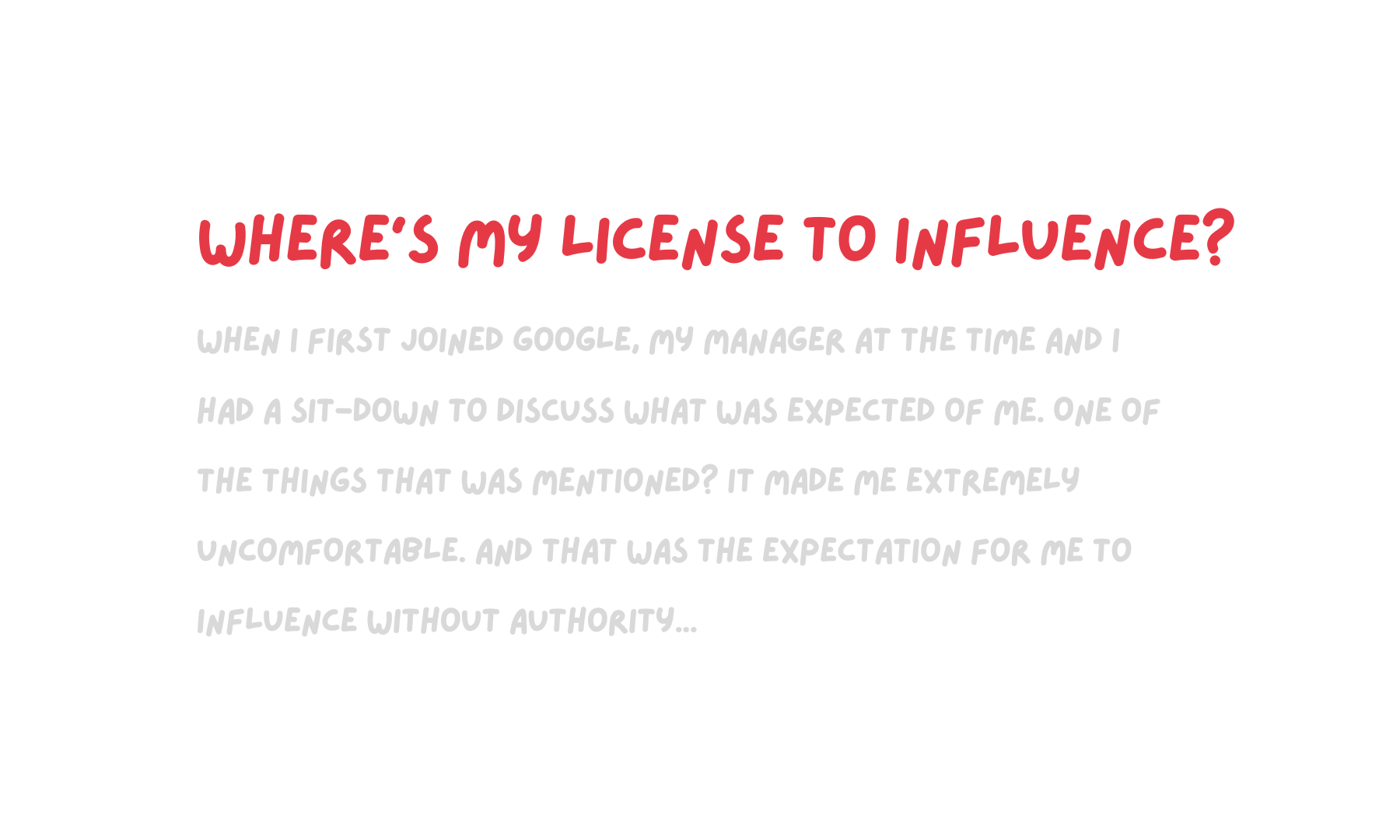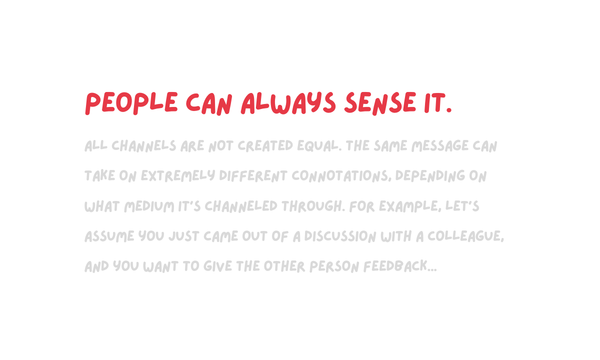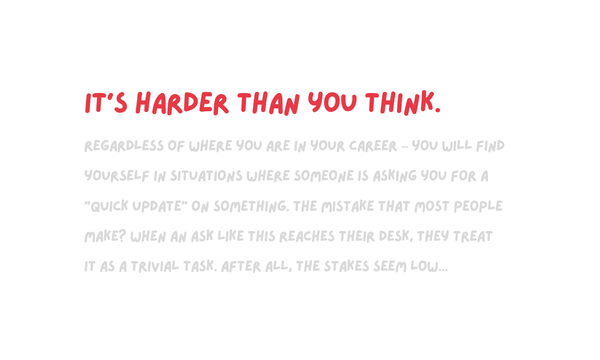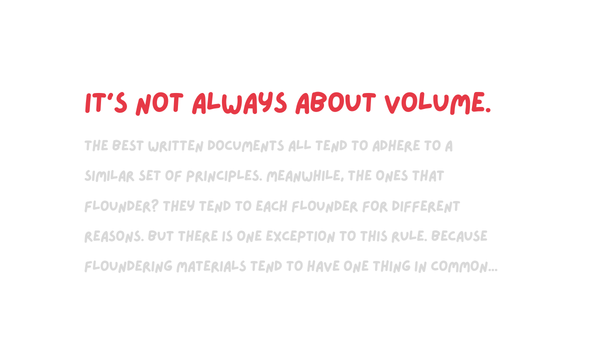How does a junior person influence without authority?

When I first joined Google, my manager at the time and I had a sit-down to discuss what was expected of me.
One of the things that was mentioned? It made me extremely uncomfortable.
And that was the expectation for me to influence without authority.
To me, it just didn't make sense. Because:
- I was new to the market
- I was new to the industry
- I was junior and green
So while I nodded along politely during that conversation? I was extremely skeptical.
I figured I'd hunker down, get better at my job, and build up some street cred first. Then I'd worry about this influencing thing.
Of course, this was not the right way to start a new job. But I didn't realize it until many years later.
(And by then – I wanted to kick myself for all the lost time.)
So in today's issue, we'll talk about how I figured out how to influence without authority – even as a junior person.
Specifically, there are three "hacks" I ended up applying:
- Leverage "data" to get invited to the dance.
- Find a way to gain that "holistic" view.
- Remember that if you "hold the pen," you have influence.
👋 Join 5000+ readers and subscribe to Herng's Newsletter for free:
Can anyone influence without authority?
Let's be clear about one thing first: Not everyone is in a position to influence without authority.
Why? Because you actually need to bring something to the table. There's no substitute for actual value.
Whether it's influencing a senior business partner, a cross-fuctional counterpart, or a peer – it doesn't matter. There always needs to be actual value.
So in my story, while I made the mistake of undervaluing my ability to influence?
A lot of people err on the other side of the spectrum.
They focus on behaviors that appear to correlate with influence – but don't actually work in the long run.
This includes behaviors like:
- Relying on politicking or gossiping to gain people's ear
- Anchoring on bravado and showmanship to create trust
- Taking liberties with how they represent or convey information
These are things that may temporarily give you leverage – but will backfire eventually.
So instead – here are 3 better ways to influence without authority.
#1 Leverage "data" to get invited to the dance.
As a junior analyst, anything data-related usually fell into my lap – especially if it entailed less-than-glamorous grunt work.
But there were several upsides to it, including:
- It was my "entry ticket" into meetings with much more senior folks
- It was a way for me to develop a natural "feel" for the business
- It gave me a natural license to speak up or even challenge
Of course, none of these things automatically made me more senior than I actually was. But it did give me a seat at the table. And it gave me a natural way to inject myself into the conversation.
I was taken more seriously than I would've been otherwise.
Now, while being the "data person" alone doesn't give you the full credibility you need to influence, it does give you these perks:
- You get a taste of what it feels like to be an expert in something, and what it feels like to hold your own weight. Confidence can then beget confidence.
- You get to be in the room and hear how senior people think – which helps you broaden your vantage point and deepen your understanding of the business, furthering your credibility.
- You build up a reputation of being trustworthy and data-driven – both of which can contribute to your gravitas down the line.
But to put yourself in these situations and set yourself up for success? You have to do two things.
The first is to be impeccable at what you do. In this case, if data is your entry ticket, then what you bring to the table better be error-free, sharp, and insightful.
(It's a double-edged sword, really. You're invited to the exclusive dance – but you're also held to a much higher standard.)
The second is to position yourself to be more than just a data monkey.
Yes, your proximity to the data might give you the confidence to speak up. But you need to think and speak beyond the data; otherwise you're actually doing yourself a disservice.
For instance, consider the following spiel:
❌ "Here is our estimated headcount productivity by market. The data is based on a mix of self-logged entries and what we pulled at scale from signed contracts. Note that there are couple caveats when it comes to the data..."
The issue? Focusing too much on explaining methodology, and not enough on implications for the business. You're invited to the meeting as a data analyst; you'll leave the meeting being seen as no more than one as well.
Consider an alternative spiel, however, that speaks to what leaders care about, without compromising data integrity:
✅ "Our analysis suggests that 2 out of our 6 markets are overstaffed, and rebalancing across markets could lead to X% revenue improvement. The data isn't perfect, but these are strongest hypotheses based on the signals, and I'm happy to talk through the methodology as well."
Remember: the goal is not to pretend to be more senior than you actually are.
Instead, it's to recognize the unique angle through which you can add value and influence people – and challenge yourself to communicate on a level that people actually care about.
👋 Join 5000+ readers and subscribe to Herng's Newsletter for free:
#2 Find a way to gain that "holistic" view.
As a junior analyst, it took me a long time before I felt comfortable asserting my views in front of tenured colleagues – let alone influencing them.
One of the biggest reasons? I didn't feel like an expert in anything.
Meanwhile, everywhere I looked, I saw either people who had been in the market for years, or people who spoke to customers everyday.
I did not feel like I had a license to opine – much less to influence.
What I didn't realize until later on, however, was that I could add value in other ways. I didn't have to wait until I had enough "experience" under my belt.
I was in a unique position to look at the business holistically – something that the "experts" didn't always have the bandwidth (nor the vantage point) for.
My angle was breadth, rather than depth.
Once I realized this, I started seeing more and more opportunities to "connect the dots."
For instance, in my first couple years at Google, I covered several verticals. I was not an expert in any single vertical – but I was also the only one in a unique position to draw patterns across the board (with a neutral agenda to boot).
Or consider a few years later, where I worked on a regional team which covered multiple markets. Again, I wasn't an expert in any single market – but my role gave me visibility across the region.
(I still felt like I only knew a little. But it turns out that I knew a little about a lot.)
In fact, the most unexpected form of breadth came much later into my Google journey, where I realized I that despite not being a specialist in one particular area – I had inadvertantly worked on many different types of problems over the years.
As a result? Pattern recognition became easier and easier. And it gave me the confidence to speak up, despite often being the most junior person in the room. Because I'd have seen a version of it before, somehow.
Influencing without authority became easier as well.
👋 Subscribe for free to get Herng's newsletter directly in your inbox.
#3 Remember: if you hold the pen, you have influence.
Another mistake I made for a while?
Assuming that influencing could only take place in certain forums or meetings, where I was explicitly expected to weigh in.
But on the contrary, there were actually plenty of opportunities for me to influence in my day-to-day work. Even as a junior analyst.
Because I didn't realize that whenever I took the pen (i.e. being the actual person to build the slides or write the docs), I was in a prime position to exert my influence.
See, here's the thing: even if you're on the receiving end of a prescriptive brief, you shouldn't ever think of your role as to simply transcribe.
You need to realize that there is almost always a gap between what people envisage in their heads, and what actually makes sense on paper. No brief is infallible.
And if you're the person who is actually putting pen to paper? You're in a fantastic position to influence – even if you don't feel like you're actually in the driver's seat.
For instance, as a junior analyst, I would often be given explicit guidance on what materials to build or what content to create. The brief would be something like:
"We need to lobby leadership for more resources. Can you create one slide on the market opportunity, one slide on the competition gap, one slide on resourcing needs..."
If you think your job is to merely transcribe and execute? You won't be thinking critically about what you're building. You'll simply take the brief, put words on a page, force-fit the storyline if need be – and move on.
But if you actually see it as an opportunity to influence? You operate on a completely different mindset. And you might then realize:
- "Hmm, after digging into the numbers, the market opportunity is smaller than what people think, and I think we need to dial down our tone..."
- "Hmm, after some analysis, I don't think frontline resourcing will solve the gaps we're seeing, given the issues are mainly pricing-driven..."
- "Hmm, after speaking to other stakeholders, I think instead of lobbying leadership, we should first explore doing X & Y, which are low-hanging fruit..."
And this is really what separates the best operators from the rest. Because the best operators understand that there is nothing trivial about transforming loose thoughts into robust written content.
Instead, they recognize that whenever you hold the pen, you have agency and influence. And they speak up accordingly.
Remember: You will rarely be told explicitly that you have the license to reshape or even challenge the original brief – but you always do.
And that's the lesson I learned too late.


